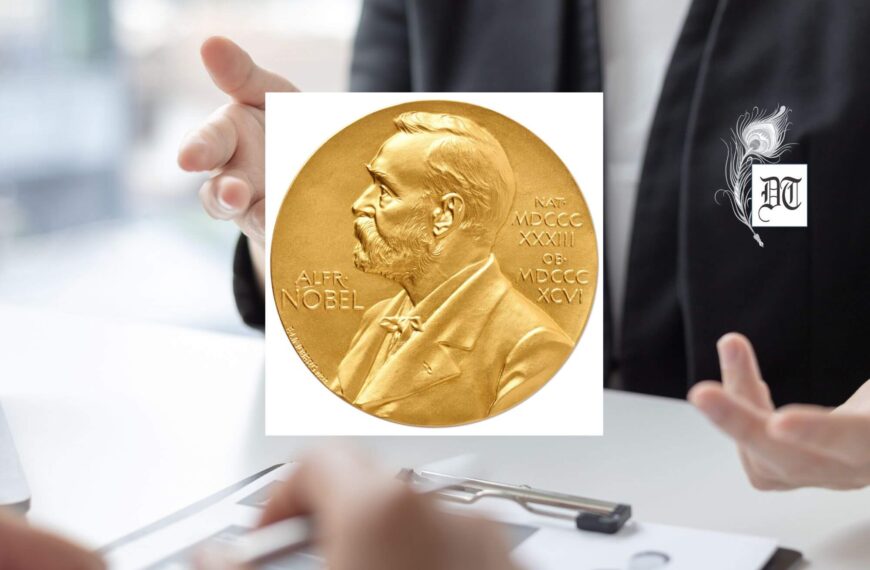A newborn does not care about the mother’s credentials, caste, class, culture, creed or colour — only that the mother’s arms are strong, her hands supportive and gentle, that there is food, shelter, time to dream, and something to hope for, rather than violence. Michele raises several questions on Women’s Day, as part of the Special Feature. A Different Truths exclusive.
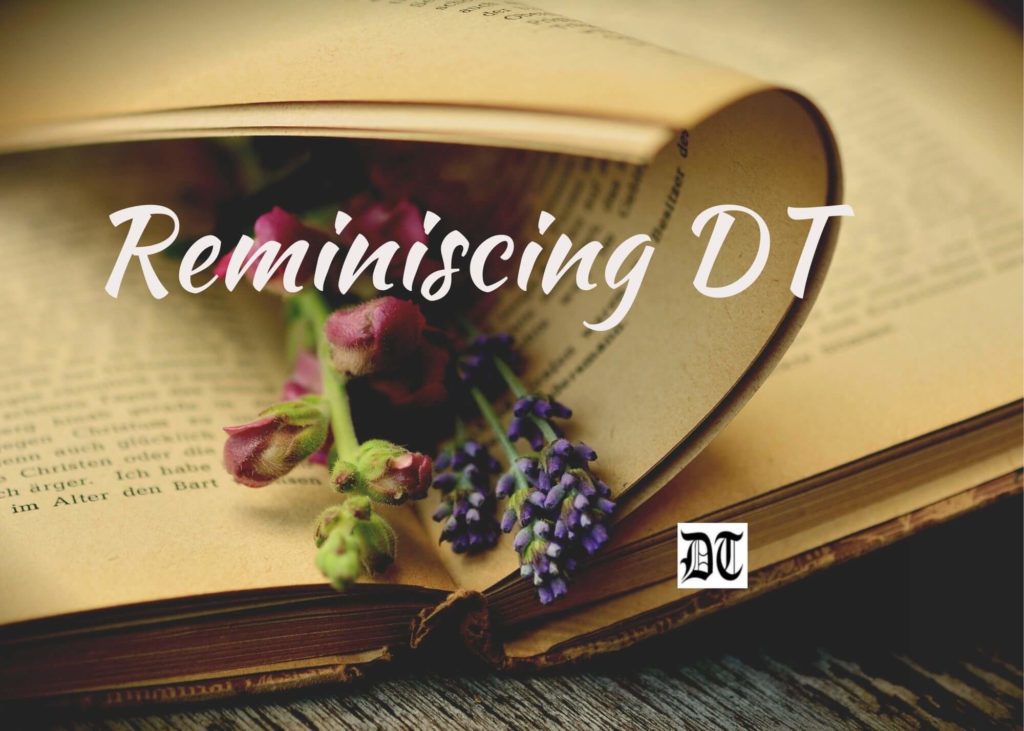
We live in a world of rapidly evolving circumstances, with often-emotional responses communicated nearly instantaneously via print, digital, video and other media. Some people are more highly educated than ever before; other people are learning as best they can by word-of-mouth and serendipitous encounters with situational learning experiences.
Kind of the way things have been for much of our recorded history.
So what is this brave new world we find ourselves in? A world filled with optimism, opulence, opportunism and obsolescence balanced upon Millennium Development Goals and calls for peace, for sustainable living, for responsible choices, for base-of-pyramid opportunities, and grass roots mobilization to effect changes.
A world of burgeoning cognizance of the need for the Rule of Law, not the Rule of Loud, nor the Rule of Laissez Faire — because it seems, increasingly, that the trickle-down benefits of permissive Laissez Faire “growth” is not as munificent, or even as sufficient as touted.
But in this tweet, meme and what’s up world, if you provide a podium with a microphone and television camera or two, supply a few flags, some flowers and potted palm trees, a couple of talking heads with impressive titles, backed up by a handful of subject-matter experts displaying impressive credentials of their own, you could have a speech supporting political and economic development in the town of Almost Anywhere that holds elections and has city-management budgets to be discussed.
People can love their cities, their towns, their rural, pot-holed, grass-centred dirt-track roads to the Middle of Nowhere. I know I do—even if that same dirt road is impossible to plough in the winter, and washes out at least once each spring and every storm season. Every bend in my particular lonely, dusty road tells me that I am on my way home. No other road, anywhere in the world, holds quite the same impact for me.
Maybe it’s the same for everyone, in their own regions and neighbourhoods and corners of the world we share. Families can love their elders, their children, their differently-abled dependents. Mom-and-Pop businesses, local medical providers, service providers, farm-to-table providers can know their customers and grow their efforts accordingly. People can work to support their dreams. People can join together to support causes, or faith in something larger than themselves.
Popular culture thrives on its glitter and glitz, its promises, and the premise that we can learn more, do more, be more, by participating — If not in the actual efforts to effect change, than by buying it (with cash or credit) to the kaleidoscope of entertainments our array of high-tech and traditional capabilities are able to offer.
Barring the technological advances, a few new boundary lines, and some horrific wars and disasters, things haven’t changed much in a few thousand years. Too often, people in the spotlight, in the seats of power, learn the words most people want most to hear, and if they are not effective speakers, they hire others, demographically-tested to assure the favourable articulation of the messages they want to convey, to speak for them.
In daily life, and especially in the wake of disasters, or wars, or refugee crises, people who walk with working-class shoes or the cast-off shoes of the underserved, people who wear working-class and second-hand and donated clothes pull together, work more diligently, trim their hopes, and tighten their belts, and strive to ensure better lives for subsequent generations.
Admittedly, the problems of particular to some regions, some communities and neighbourhoods and enclaves are not the specific problems of others. Some face gun violence from disenfranchised citizens. Some face the violence of terrorism from disenfranchised groups. Some face the violence of crime attributable to poverty, or to drugs, or to a plethora of other causes. Some face gender-based violence, age-based violence, circumstantial aggression perpetrated in the shadows and peripheries, and perpetuated by a tacit reluctance to complain or stand up against those seemingly protected by the bastions of the powers-that-be.
This isn’t just a human trait, though it seems we are the only earth species to have developed codified laws to substantiate and give credence to the “system” which enables it.
For a long time, people, families, fathers, brothers, sons, mothers, sisters, daughters, have bought into the fiction that there is something admirable about stoicism in the face of egregious wrongs, that there is a required period of silence when faced with incidents of shocking, overwhelming social or individual violence—like school shootings, subway poisonings, hotel burnings, hostage killings… We pay attention to the effects on business, on social structures, and don’t do much more than look on, and offer “thoughts and prayers” for the families and individuals caught up in the horrific dramas of social dysfunction.
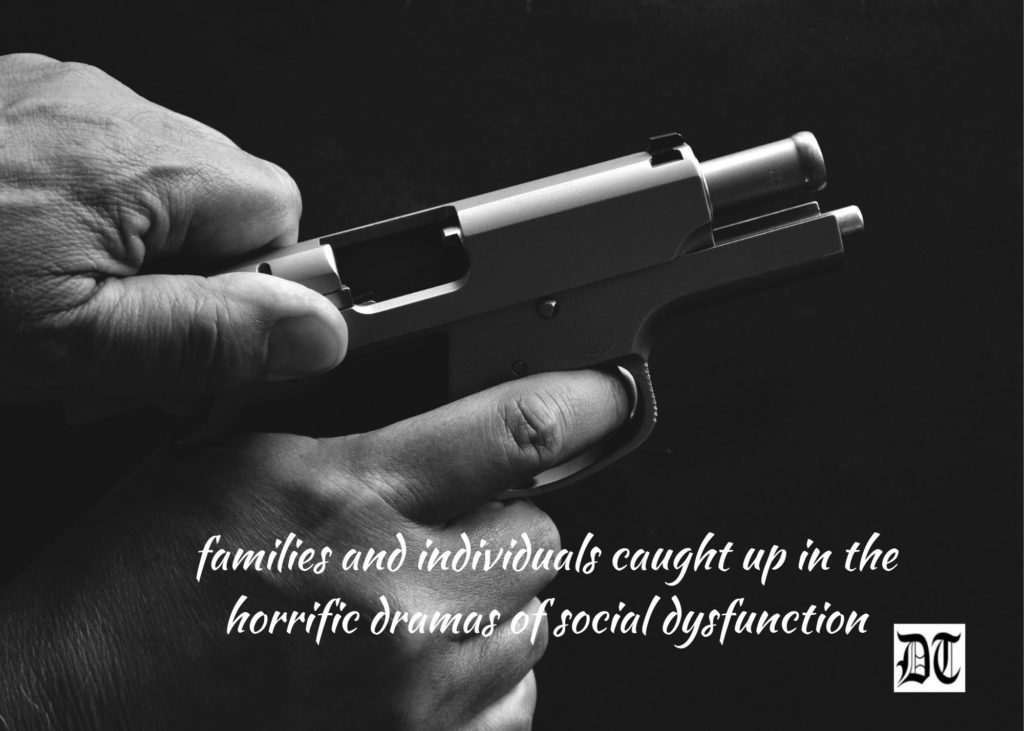
This silence is lessened, somewhat, in the wake of natural disasters, or massive population shifts brought on by famine, disease, or war. Often, in such events, thankfully, NGOs, social organisations and ranks of good-hearted, nearly-anonymous donors mobilize to offer aid to the survivors, the needy, the suffering. But even here, attention and aid efforts assume a tempo and tone tailored to the predictable reactions of the donor pool to the perceived “acceptable” requirements of the “needy.”
Looking at the cavalcade of societies, of social norms and community expectations across our shared history, there are some common factors.
A newborn does not care about the mother’s credentials, caste, class, culture, creed or colour — only that the mother’s arms are strong, her hands supportive and gentle, that there is food, shelter, time to dream, and something to hope for, rather than violence.
A parched throat and starving stomach do not care about the credentials, caste, class, culture, creed or colour of the hands reaching for food; no matter what the brain might have been taught, no matter what the eyes have been conditioned to see, the ears to hear, the mouth to espouse. Faced with vast challenges, with great need, we, at our most basic human-ness, are not so different from that newborn. We are thirsty, we are hungry. We are tired, cold, alone, possibly fearful and without shelter. We may know the cultural and demographic realities by which we are recognized, labelled, even defined — but in the crucible of need, is any of that really relevant? Does it matter if my hand is white, or red, or yellow, or brown, or black, calloused with work or spotted with age, female or male, strong, or weak, or differently-abled, if I am starving? If I am uneducated, uninsured, underserved?
Demographic measurements may help identify and quantify acute, endemic, or isolated needs. NGOs, activists, social media and grass-roots efforts may raise awareness. Legislation and law enforcement may help alleviate long-standing problems, may encourage solutions to crisis situations, to failures in social protection flooring or “glass ceiling” inaccessibility, it is true. But it is just as true that special interests, “Big” businesses and the lobbyists that support them have a vested interest in any “new normal” that protects the working-class status quo that enables an exclusive, vetted inclusion in the echelons of public media, politics, power, and profit. Sure, there are tech superstars, entrepreneurial whizzes, who beam with all the pomp and puffery of market-driven conquests, trained and credentialed and highly-praised creatives and professionals who attain the pinnacles of recognition in their fields, but the publicity
accorded these “success stories” far outstrips their prevalence. Even less sizable is the percentage of women who may be numbered among these most-lauded scions of their professions.
There are so many places in the world where behaviors, choices, and consequences hearken back to the ancient laws which defined, enabled and perpetuated varieties of systems fraught with racial, cultural, gender, age, and class-based problems, centuries and millennia ago. Many now look to those who have been relatively voiceless — women, children, dependent sectors, to provide the impetus of change, the groundswell of action which could empower our global civilizations to become, at last, perhaps, civil.
Peaceful. Sufficient. Sustainable.
How do we find these new voices, these strong arms and supportive hands? How do we educate, empower, mobilize, integrate them, so we can raise our heads, and look to a future less fractured, more “civilized”?
Morocco recently passed laws increasing rights and protections for women; so have other nations, other states, other communities. There are other nations, other states, other communities where, just as powerfully as any pressures of cultural tradition or religious precept, outdated laws cling to antiquated perceptions, choices and actions. In 25 out of 50 states in the USA, children not old enough to vote are permitted, in accordance with laws currently in force, to be married.
Let’s go back to that newborn mentioned above. Would the baby “care” how old the child mother was? How old the father? If the mother was educated, mature, self-sufficient, or subsisting, or underserved, a member of an at-risk, or voiceless class?
The infant has no perspective from which to ascertain if the mother, so crucial to survival, is sufficient to, and capable of, bonding, and tendering early lessons of trust, and later lessons of courage, tolerance, of human potential and growth. The infant cannot know if the mother is free or oppressed or underserved or trafficked. The infant needs milk, a clean, safe, warm place to rest, a place to grow. The infant does not know if the stigma of non-marital, or low-caste, or interracial, or religious, cultural, social/political or economic bias looms to taint a life barely even formed.
Who does know?
We do.
We — the wives, mothers, sisters, daughters…
We — the husbands, fathers, brothers, sons…
We know.
And we can, we must, find the strength of heart, of mind, of hands joined by our common tenure upon this planet we share, to enable humanity to become, at last, humane. We must stand firm in our efforts to empower civilizations to become, to remain, at last, civil.
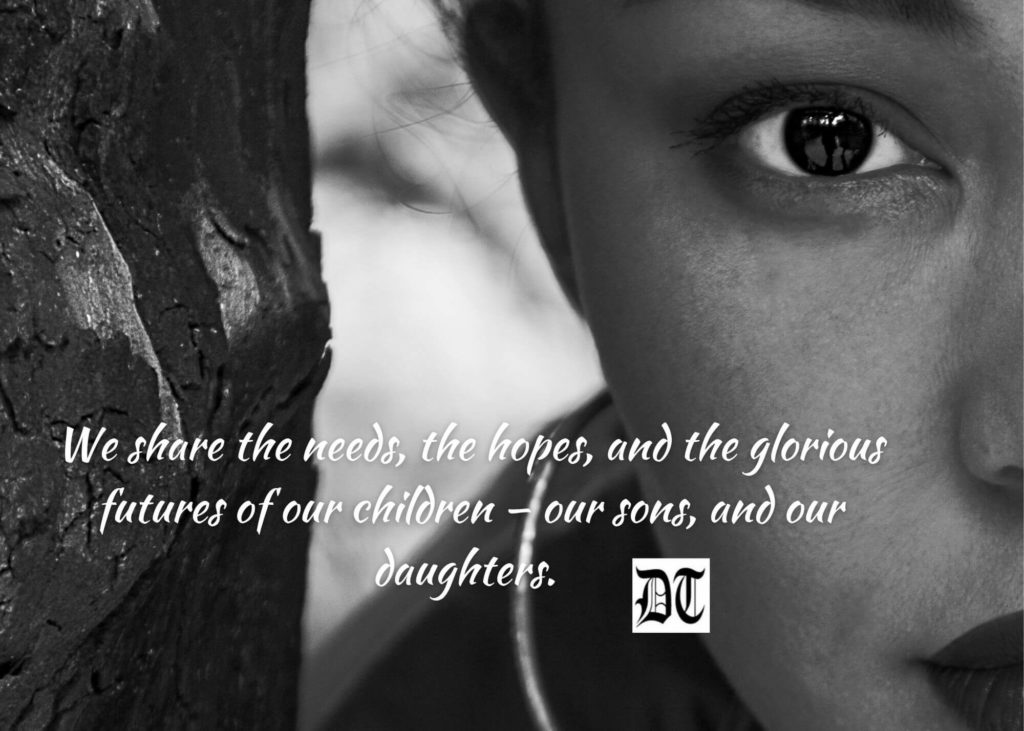
We must recognise the responsibilities we all share to tolerate the superficial differences which contribute to our individual tastes, traditions, teachings, and to acknowledge and meet the needs which define the indivisible nature of our human lives. We share a planet, with its fragile ecosystem. We share humanity, with all our frailties, and our strengths. We share the capacity to learn, to understand, to tolerate, to effect change.
We share the needs, the hopes, and the glorious futures of our children — our sons, and our daughters. We are male, and we are female. We are, by nature, by choice, by science, by emotion, a veritable cornucopia of traits … and we should not be excluded, nor bound to silence, not burdened under insurmountable biases of origin, access, age, or gender.
It is said that women hold up half the sky — that they have done so, in whatever form they could, throughout history. Women have held up half the sky for all our yesterdays; women hold up half the sky today. Women are part of every family, every neighbourhood, every religion — and we salute our wives, mothers, sisters, and daughters through Women’s Day observances and celebrations around the world. And that is wonderful.
But our infants, our sons, brothers, fathers, husbands, our daughters, sisters, wives and mothers, do not live only on this one day out of the year.
We accept the challenges and salute the achievements of our sisters, our daughters, our
mothers today, on this Women’s Day.
Embracing the inclusion of vast potential in women still struggling to be recognized and heard, in professions and at levels commensurate with their talents and abilities today, who knows what we will have learned, what we may have achieved, tomorrow?
Picture designed by Anumita Roy, Different Truths

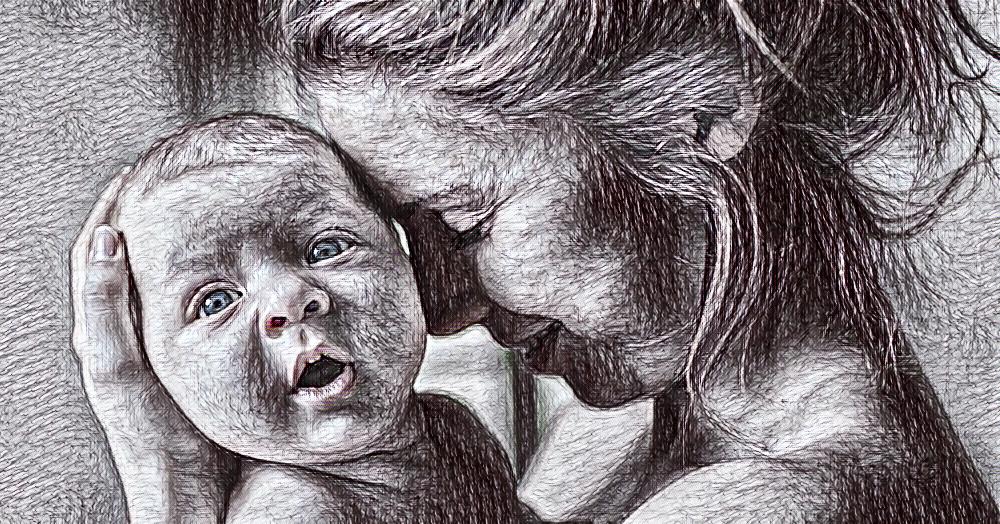

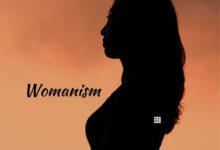
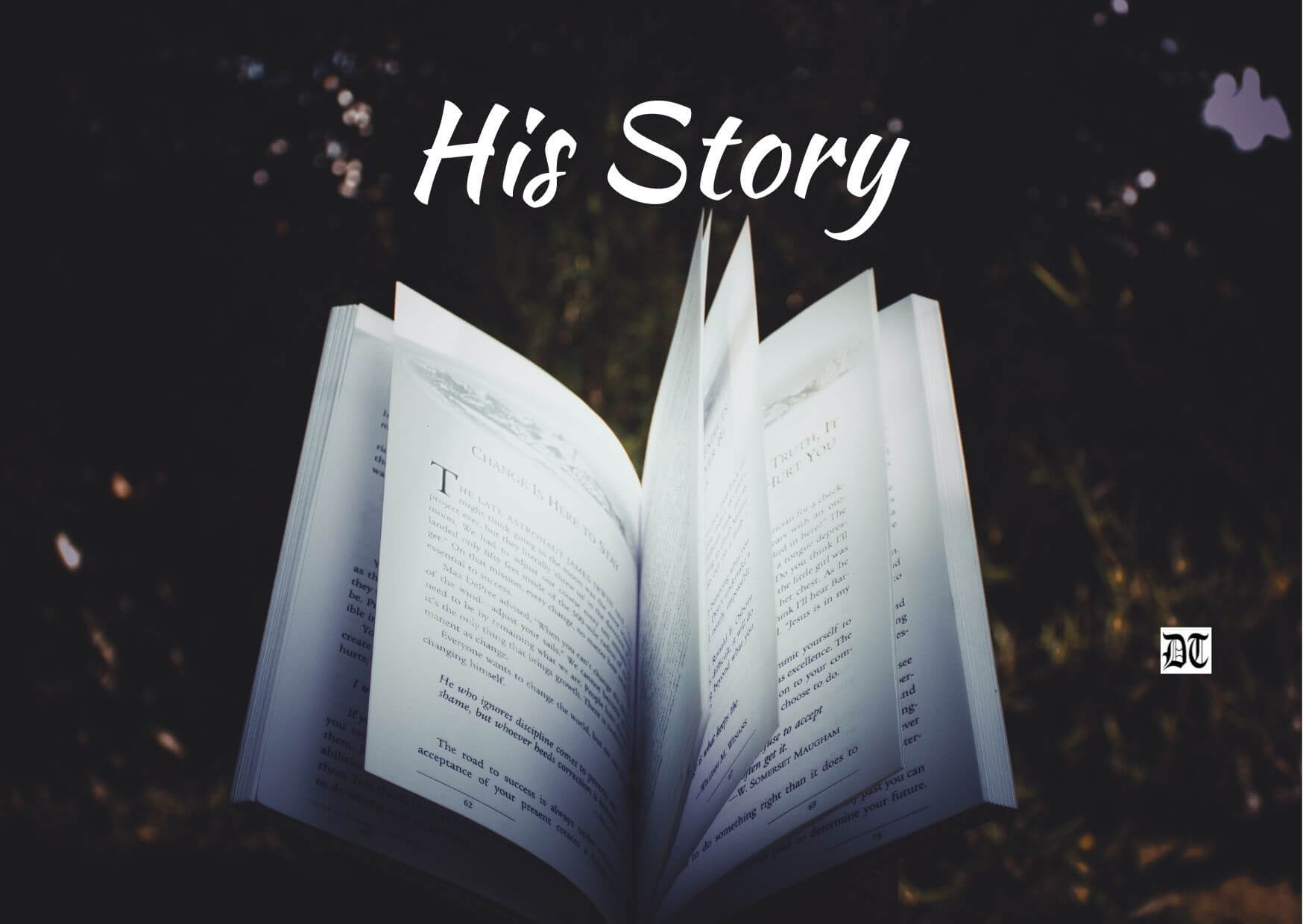

 By
By
 By
By